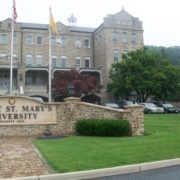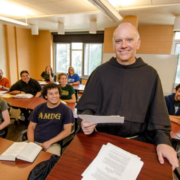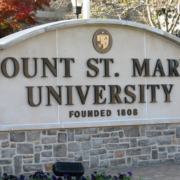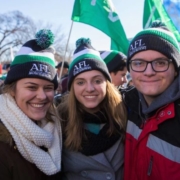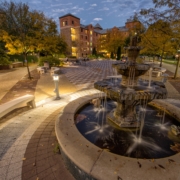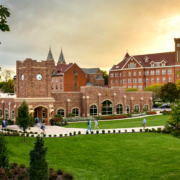Scandal Persists at Mount St. Mary’s University, President Defies Own Speaker Policy
The Cardinal Newman Society is deeply saddened by the apparent decision of Mount St. Mary’s University President Timothy Trainor to violate the University’s own “Speaker Policy” and its Catholic mission by honoring Mark Shriver, a public advocate for abortion and contraception, as its 2019 commencement speaker.
For details, see the Newman Society’s prior statement, dated April 5.
President Trainor this week notified the Mount community by email that Shriver has “graciously declined” the Mount’s “offer to award him an honorary degree.” Not only is this not the principled decision that we had prayed for—Shriver declined the honorary degree, but the University took no action to uphold its Catholic identity and protect others from scandal—but it also leaves in place the invitation for Shriver to deliver the commencement address.
Moreover, President Trainor again identifies Shriver’s illicit leadership at Save the Children, which actively promotes “family planning” to disadvantaged people, as the University’s reason for honoring Shriver and presenting him as a model for graduating students.
“Mark Shriver was selected as our commencement speaker because of his groundbreaking work with Save the Children for the last sixteen years and his well-regarded biographies of his father, Sargent Shriver, and His Holiness, Pope Francis. We are looking forward to his remarks,” Trainor wrote in his email to students.
The choice of Shriver as commencement speaker violates the Mount’s own “Speaker Policy,” found in the University’s governing documents. The policy reads, in part (boldface added, not in original):
Occasionally the university invites a guest to campus for the purpose of honoring that guest. In addition to the considerations outlined above, the decision to honor a person must take into account his or her character as reflected in the actions he or she performs and supports. Mount St. Mary’s affirms the position, articulated by the United States Conference of Catholic Bishops, that “Catholic institutions should not honor those who act in defiance of our fundamental moral principles;” especially those moral principles concerning the sanctity and dignity of all human life. Those whose actions show disregard for such fundamental principles “should not be given awards, honors or platforms which would suggest support for their actions” (“Catholics in Political Life,” USCCB, 2004). The president of the university will seek counsel from the Archbishop of Baltimore, whenever there is a question about the appropriateness of honoring someone.
Selection to deliver a commencement address is unmistakably an honor. It would insult the intelligence of the Mount community, were the University to claim that only an honorary degree is an honor, because it contains the word “honor.” A commencement address is a much-prized, highly publicized, ceremonial address holding up the speaker as an example to graduates. Rarely does it contain anything of academic merit, but instead draws upon the speaker’s character and accomplishments to give advice to students. In this respect, inviting Shriver to deliver the commencement address may be even more offensive and less consistent with Catholic education than bestowing an honorary degree.
President Trainor seems to be aware that the invitation to Shriver is a mistake and violates the University’s policy. According to the Mount’s student newspaper, “Trainor apologized for the division and stress this issue has created for the Mount community, particularly the seniors. He also acknowledged that the research into the selection of a commencement speaker was not as thorough as it should have been. The Board and Trainor are working to refine the process to prevent this from occurring again.”
The Newman Society has long recognized Mount St. Mary’s University as one of America’s most faithful Catholic colleges, and each year the Mount assures the Newman Society in writing that it complies with the U.S. bishops’ ban on honors and platforms for public opponents of Catholic teaching. That assurance, too, is violated by the invitation to Shriver.
We are eager to know how the University will prevent such scandals in the future, when a policy is already enshrined in the governing documents. More urgently, we look to Mount St. Mary’s University to uphold its Catholic identity in the present and rescind the invitation to Mark Shriver to speak at commencement.

